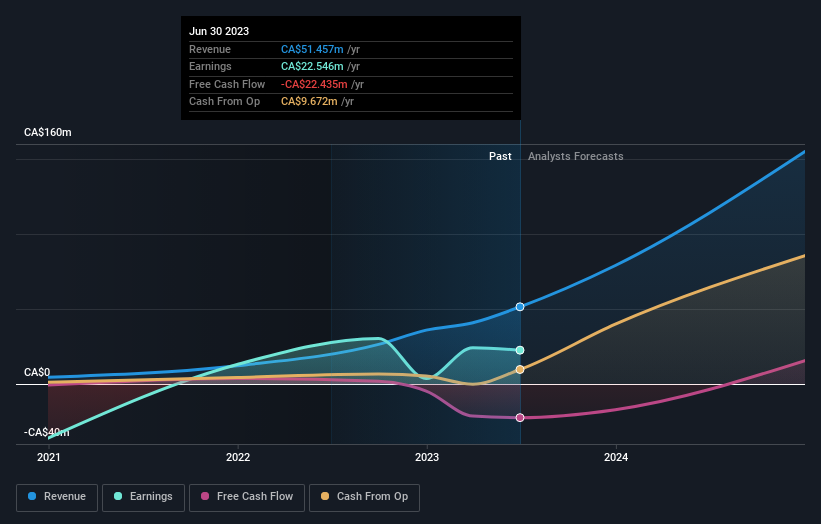While private equity firms own 11% of Lycos Energy Inc. (CVE:LCX), individual investors are its largest shareholders with 55% ownership
Key Insights
The considerable ownership by individual investors in Lycos Energy indicates that they collectively have a greater say in management and business strategy
28% of the business is held by the top 17 shareholders
Using data from company's past performance alongside ownership research, one can better assess the future performance of a company
Every investor in Lycos Energy Inc. (CVE:LCX) should be aware of the most powerful shareholder groups. And the group that holds the biggest piece of the pie are individual investors with 55% ownership. Put another way, the group faces the maximum upside potential (or downside risk).
Meanwhile, private equity firms make up 11% of the company’s shareholders.
Let's take a closer look to see what the different types of shareholders can tell us about Lycos Energy.
View our latest analysis for Lycos Energy
What Does The Institutional Ownership Tell Us About Lycos Energy?
Many institutions measure their performance against an index that approximates the local market. So they usually pay more attention to companies that are included in major indices.
Institutions have a very small stake in Lycos Energy. That indicates that the company is on the radar of some funds, but it isn't particularly popular with professional investors at the moment. If the company is growing earnings, that may indicate that it is just beginning to catch the attention of these deep-pocketed investors. When multiple institutional investors want to buy shares, we often see a rising share price. The past revenue trajectory (shown below) can be an indication of future growth, but there are no guarantees.
We note that hedge funds don't have a meaningful investment in Lycos Energy. Our data shows that Carbon Infrastructure Partners Corp. is the largest shareholder with 15% of shares outstanding. Meanwhile, the second and third largest shareholders, hold 3.8% and 2.0%, of the shares outstanding, respectively. David Burton, who is the second-largest shareholder, also happens to hold the title of Chief Executive Officer.
A deeper look at our ownership data shows that the top 17 shareholders collectively hold less than half of the register, suggesting a large group of small holders where no single shareholder has a majority.
While studying institutional ownership for a company can add value to your research, it is also a good practice to research analyst recommendations to get a deeper understand of a stock's expected performance. There is a little analyst coverage of the stock, but not much. So there is room for it to gain more coverage.
Insider Ownership Of Lycos Energy
While the precise definition of an insider can be subjective, almost everyone considers board members to be insiders. Company management run the business, but the CEO will answer to the board, even if he or she is a member of it.
Most consider insider ownership a positive because it can indicate the board is well aligned with other shareholders. However, on some occasions too much power is concentrated within this group.
We can report that insiders do own shares in Lycos Energy Inc.. In their own names, insiders own CA$15m worth of stock in the CA$202m company. This shows at least some alignment, but we usually like to see larger insider holdings. You can click here to see if those insiders have been buying or selling.
General Public Ownership
The general public -- including retail investors -- own 55% of Lycos Energy. This level of ownership gives investors from the wider public some power to sway key policy decisions such as board composition, executive compensation, and the dividend payout ratio.
Private Equity Ownership
Private equity firms hold a 11% stake in Lycos Energy. This suggests they can be influential in key policy decisions. Some investors might be encouraged by this, since private equity are sometimes able to encourage strategies that help the market see the value in the company. Alternatively, those holders might be exiting the investment after taking it public.
Next Steps:
While it is well worth considering the different groups that own a company, there are other factors that are even more important. Consider for instance, the ever-present spectre of investment risk. We've identified 2 warning signs with Lycos Energy (at least 1 which is a bit concerning) , and understanding them should be part of your investment process.
But ultimately it is the future, not the past, that will determine how well the owners of this business will do. Therefore we think it advisable to take a look at this free report showing whether analysts are predicting a brighter future.
NB: Figures in this article are calculated using data from the last twelve months, which refer to the 12-month period ending on the last date of the month the financial statement is dated. This may not be consistent with full year annual report figures.
Have feedback on this article? Concerned about the content? Get in touch with us directly. Alternatively, email editorial-team (at) simplywallst.com.
This article by Simply Wall St is general in nature. We provide commentary based on historical data and analyst forecasts only using an unbiased methodology and our articles are not intended to be financial advice. It does not constitute a recommendation to buy or sell any stock, and does not take account of your objectives, or your financial situation. We aim to bring you long-term focused analysis driven by fundamental data. Note that our analysis may not factor in the latest price-sensitive company announcements or qualitative material. Simply Wall St has no position in any stocks mentioned.

 Yahoo Finance
Yahoo Finance 

